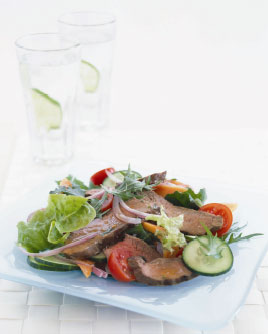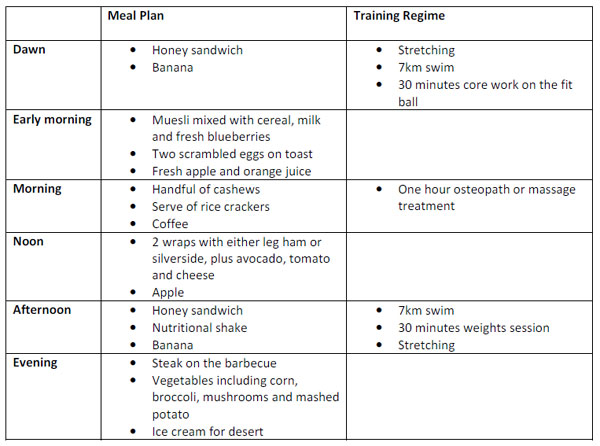Craig Stevens' secret weapon Protein Pivotal for Peak Sport Performance

NEW STUDY FINDS PROTEIN PIVOTAL FOR PERFORMANCE CRAIG STEVENS' SECRET WEAPON
A new study looking at diet, exercise and training has revealed new insights into the role that protein plays in physical performance for athletes. The breakthrough research challenges a well accepted assumption that a high carbohydrate diet is the best option for an overall active exercise and training regime, providing evidence that a higher protein diet is associated with faster muscle repair and better muscle recovery.
Conducted by Associate Professor David Cameron Smith of Deakin University, the study involved two groups of young males undertaking strenuous strength exercise. One group was given a recovery meal containing high carbohydrate foods, such as rice, breads and cereals. The second group had a higher protein meal containing lean red meat. The results revealed that those eating a higher amount of protein experienced faster muscle repair and recovery. It is thought that the amino acids present in protein foods like lean red meat are responsible.
Associate Professor David Cameron Smith explains that the traditional diet of an elite athlete is a high carbohydrate one. "The standard practice for athletes is to carbo-load before training or competition to charge muscles with fast burning carbohydrates to enhance endurance and performance. This study demonstrates that there is an important role for protein foods post rigorous exercise to assist with muscle repair and recovery. An athlete's diet does not necessarily always have to be exclusively a high carbohydrate one," he explained.
"Consuming high protein foods after exercise is a good idea for anyone interested in improving their physical performance. Lean red meat is a particularly good source of protein, but also provides a rich concentration of iron and zinc which are important for energy along with vitamin B12 and omega-3s. With such a unique bundle of nutrients lean red meat should be a part of every athlete's diet," he added.
Champion swimmer, Craig Stevens, is one athlete already embracing the higher protein approach. Acknowledging that his diet is radically different from that of his team mates, Stevens insists that red meat plays an important role in his post training routine.
"A typical training day starts at 5.00am for me and involves a couple of sessions at the pool, swimming up to seven kilometres, as well as dry land activities including core strength, cardio, weights and stretching. Training is intense and to be at my peak and assist the muscle recovery and repair process I always include high protein foods, including red meat on my dinner plate. If I don't do this at least 3 to 4 times a week I find that my body doesn't recover as well to back up for the next training session. You can't beat a steak on the barbecue, coupled with fresh vegetables!"
Commenting on Associate Professor David Cameron Smith's work Stevens added: "I have always loved red meat, so to know it can play such a significant role in muscle repair and recovery is great reassurance."
Craig Stevens - typical meal plan and training regime

A new study looking at diet, exercise and training has revealed new insights into the role that protein plays in physical performance for athletes. The breakthrough research challenges a well accepted assumption that a high carbohydrate diet is the best option for an overall active exercise and training regime, providing evidence that a higher protein diet is associated with faster muscle repair and better muscle recovery.
Conducted by Associate Professor David Cameron Smith of Deakin University, the study involved two groups of young males undertaking strenuous strength exercise. One group was given a recovery meal containing high carbohydrate foods, such as rice, breads and cereals. The second group had a higher protein meal containing lean red meat. The results revealed that those eating a higher amount of protein experienced faster muscle repair and recovery. It is thought that the amino acids present in protein foods like lean red meat are responsible.
Associate Professor David Cameron Smith explains that the traditional diet of an elite athlete is a high carbohydrate one. "The standard practice for athletes is to carbo-load before training or competition to charge muscles with fast burning carbohydrates to enhance endurance and performance. This study demonstrates that there is an important role for protein foods post rigorous exercise to assist with muscle repair and recovery. An athlete's diet does not necessarily always have to be exclusively a high carbohydrate one," he explained.
"Consuming high protein foods after exercise is a good idea for anyone interested in improving their physical performance. Lean red meat is a particularly good source of protein, but also provides a rich concentration of iron and zinc which are important for energy along with vitamin B12 and omega-3s. With such a unique bundle of nutrients lean red meat should be a part of every athlete's diet," he added.
Champion swimmer, Craig Stevens, is one athlete already embracing the higher protein approach. Acknowledging that his diet is radically different from that of his team mates, Stevens insists that red meat plays an important role in his post training routine.
"A typical training day starts at 5.00am for me and involves a couple of sessions at the pool, swimming up to seven kilometres, as well as dry land activities including core strength, cardio, weights and stretching. Training is intense and to be at my peak and assist the muscle recovery and repair process I always include high protein foods, including red meat on my dinner plate. If I don't do this at least 3 to 4 times a week I find that my body doesn't recover as well to back up for the next training session. You can't beat a steak on the barbecue, coupled with fresh vegetables!"
Commenting on Associate Professor David Cameron Smith's work Stevens added: "I have always loved red meat, so to know it can play such a significant role in muscle repair and recovery is great reassurance."
Craig Stevens - typical meal plan and training regime

MORE



